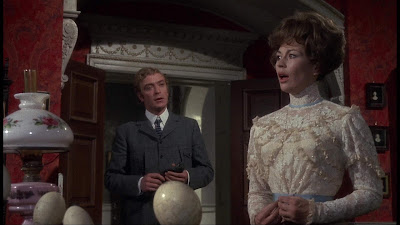 Best Defense (Willard Huyck, 1984) Time to pull the pin of this grenade, light the fuse on this bomb, pull the switch, and send it down the ol' chute. Actually it doesn't need my help at all. Best Defense, a comedy about incompetence in military contractors, * does its own job for it by self-destructing.
Best Defense (Willard Huyck, 1984) Time to pull the pin of this grenade, light the fuse on this bomb, pull the switch, and send it down the ol' chute. Actually it doesn't need my help at all. Best Defense, a comedy about incompetence in military contractors, * does its own job for it by self-destructing. Spear-headed by the husband-wife team of Willard Huyck and Gloria Katz (they wrote American Graffiti, but are also responsible for the nasty screenplays for Indiana Jones and the Temple of Doom and Lucky Lady and, disastrously, writing-directing Howard the Duck.), this clunking, clanking film tells the story of Wylie Cooper (Dudley Moore), an engineer for a defense contractor going out of business. By complications of circumstance, he acquires the plans for a missile system, which his company then proceeds to nickle and dime into inoperability—yes, this is a movie supporting inflating defense contracts and profits to the expense of the soldiers who use the armaments. Hilarious. So funny, it kills. Sadly, it doesn't stray too far from the truth. The best comedic aspect to the sorry show is that Paramount Pictures evidently operates under the same philosophy.Not sure what the story is, but, according to legend, audience previews for this cluster-bomb were so bad that Paramount—which must be blamed for shelling out the 18 mil' it cost to produce this—brought in then-as-hot-as-could-be Eddie Murphy as "Strategic Guest Star" to film comedic sequences (that was the intent, anyway) of him coping with the system in a conflict in Kuwait,** in an effort to salvage their investment.Didn't work. It cost 18 million to produce, and got back 19 million in revenue, not counting publicity and promotion costs. One wishes one could say it was funny, but I didn't laugh once during the amount of time I watched it.
Confession time: This is the only time I have ever walked out of a movie (It was a free preview, so I had nothing to lose but time) before it was over. I couldn't endure one more second of it, and losing any more of my life...or my love of movies...to it.***
Best Defense was the worst offence.
Moore and Murphy, looking sheepish.
* Potentially, a good source for black comedy, but might have been funnier if just done as a documentary about "The Bradley."
** The only interesting thing about this film is that it shows sequences taking place during a fictional invasion of Kuwait by Iraq, seven years before the Gulf War took place. Defenders of this film—both of them—insist that this makes the movie special in that it "predicted" The Gulf War. In reality, it didn't predict anything. It just made a safe guess where a conflict could occur. It might not occur to those defenders that it is conceivable that Saddam Hussein might have gotten the idea from watching this movie; Patton inspired Nixon to invade Cambodia. Hell, Saddam Hussein might have LIKED this movie.
*** There was one other movie I walked out on, truth be told—Hollywoodland, starring Adrien Brody, supposedly about the death of George Reeves, but was so full of falsehoods that I didn't stay for the very end of the film, which would have depicted Reeves' suicide after several sequences that suggested it was murder.







